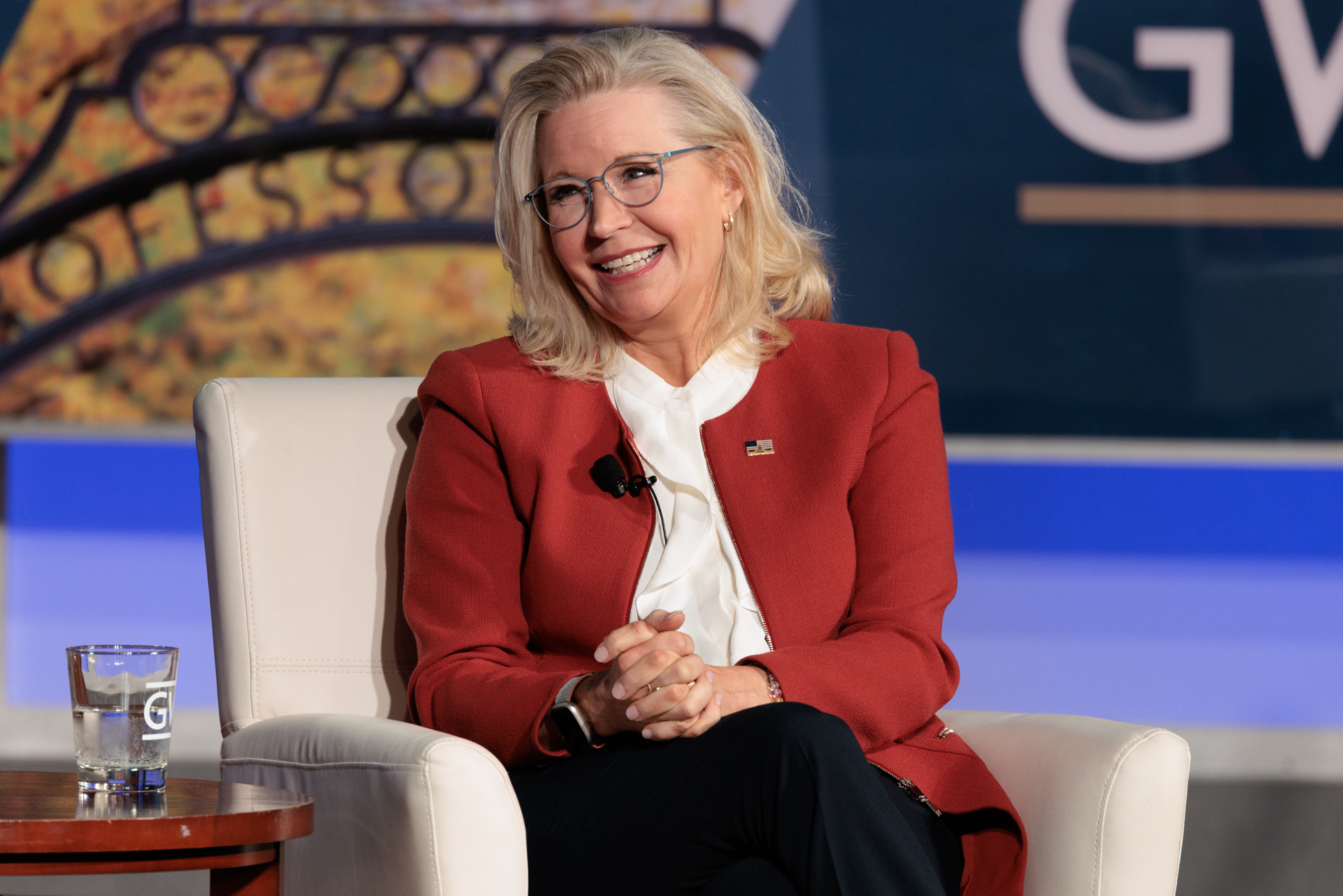This story originally appeared in GW Today.
The George Washington University's Institute for Data, Democracy & Politics (IDDP) hosted "Defending Democracy: A Conversation" with Liz Cheney on Oct. 30 at Jack Morton Auditorium. Cheney spoke with Maribel Pérez Wadsworth, president and CEO of the Knight Foundation, which funds journalism, arts, research and civic initiatives that strengthen democracy.
Brief welcoming remarks were offered by Rebekah Tromble, IDDP director and associate professor in the School of Media and Public Affairs, before Cheney and Wadsworth were introduced by GW President Ellen M. Granberg, who praised Cheney’s deep commitment to democracy. Cheney, a Republican, lost her seat in Congress after serving on the House Select Committee on the Jan. 6 Attack on the U.S. Capitol.
“Students come to GW not just to study democracy and politics, but to participate in them firsthand,” Granberg said. “Because of our location in the heart of the nation’s capital, the GW community can connect emerging fields in science, technology and innovation with law, policy, politics and ethics.” At this “critical moment for democracy,” she added, the dialogue between Cheney and Wadsworth “exemplifies these unique strengths and opportunities.”
Acknowledging the journalism students in the audience, Wadsworth began by asking Cheney to react to the recent decisions by The Washington Post and the L.A. Times newspapers not to endorse a presidential candidate, even though endorsements of Vice President Kamala Harris had already been planned.
“I think it’s very troubling, just reading the reports of how The Washington Post decision not to endorse came about,” Cheney said. When the decision not to endorse was announced, she noted, it was reported that officials from Blue Origin, a corporation owned by Jeff Bezos, the multibillionaire who owns the Post, had met with Donald Trump.

Maribel Pérez Wadsworth, left, talked with Liz Cheney about how journalists should cover the election and other topics. (William Atkins/GW Today)
“Complying in advance, preemptively surrendering, is one of the things that we see happen,” in an autocracy, she said. “You cannot maintain a democratic political process without a free press.”
After expressing agreement, Wadsworth asked about the spread of disinformation and how a fact-based discourse might be rebuilt.
“One of the most dangerous spreaders of this disinformation is Donald Trump,” Cheney said. “We all have to recognize who's attempting to spread the disinformation.”
That can be difficult, Wadsworth and Cheney agreed, in a fractured media environment, with a sizable portion of the electorate getting its news from biased sources. Social media adds a layer of complexity to the issue. We are likely to see messages that seem to be from a reputable news source, but in fact are fakes. Elon Musk’s X (formerly Twitter) is likely to be a major channel for claims of election theft, Cheney said.
“How should journalists treat election deniers and those who condone political violence?” Wadsworth asked. “There are people who make First Amendment arguments and there are others who say it’s dangerous to give a platform to misinformation.”
“Just like any American, Donald Trump has freedom of speech,” Cheney replied. “I think it’s important that the American people see what he's saying.”
Wadsworth asked Cheney about the progress of her efforts to reach disaffected Republicans and give them space to consider voting for Vice President Harris. “Many of the conversations that I have had across party lines are about the fundamental cruelty of Donald Trump,” she said.
As examples of Trump’s cruelty, Cheney described him watching on TV as the Capitol was attacked by an armed mob he sent there. She spoke of his recent lies about how people whose lives had been ravaged by hurricanes could get aid, and about his claims that Haitian immigrants in Ohio are eating the pet dogs and cats of their neighbors.
Several questions from audience members, submitted in advance, centered on the future of the Republican party. Cheney began her reply by saying she thinks Trump will lose the election.
“It’s very difficult for me to imagine a situation in which the Republican Party, after what they’ve done, can simply bounce back,” Cheney said, adding, “We’re going to see the kind of realignment—we’re already seeing it—that you don’t see very often in American politics.”
Cheney urged disaffected Republicans, especially in swing states, to vote for Harris. A vote for anyone else is equal to a vote for Trump, she said.
Good character is the quality that we should most look for in political leaders, Cheney said, adding that she thought House Speaker Mike Johnson was a good person, but she now sees him as “sinister” and has no faith that he will fulfill his constitutional responsibility to certify the election results if Trump loses.
“We need to make sure that we do everything possible to ensure that Mike Johnson and the Republicans aren’t in the majority on January 6th of 2025,” Cheney said. “I find it sad that that is where we are.”
As a final question, Wadsworth asked Cheney what gives her hope.
“I have hope because of all the people that I have talked to around the country,” Cheney said. “I have hope because of the commitment and the dedication that I know is out there, that I see in these events and these crowds and that I see from young people.”
Cheney reminded the audience of all the predictions of a “massive red wave” in 2022, which never materialized.
“One of the main reasons that it didn’t happen was because young people got out and voted. And you guys can make a difference both in your votes and in your activism and your participation in our process," Cheney said. "And we need you involved. We all get to have a say, and the vast majority of Americans want to live in a country where we have the peaceful transfer of power. They don't want to live in a place where violence determines who leads us. I feel very hopeful that all of us will get out and do the right thing.”


